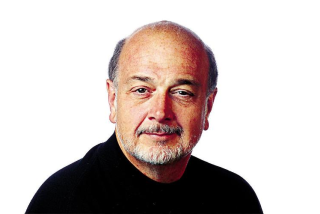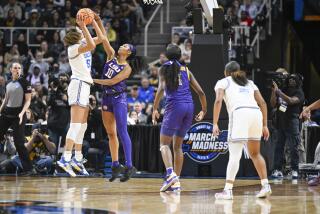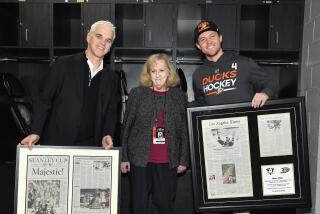How one careless act became a really big deal
- Share via
The media world has been abuzz for most of this month about the phony column that Mitch Albom, the bestselling author, wrote for the Detroit Free Press. Although Albom clearly screwed up and should be punished, I’ve been stunned by the level of outrage directed at him. Nothing less than a public beheading would seem to satisfy some of his critics.
Best known to the public nationwide for the mega-success of his books “Tuesdays With Morrie” and “The Five People You Meet in Heaven,” both of which were made into television movies, Albom has been a big name in Detroit since long before either book struck gold.
But now his name is mud.
Albom, who has written a highly regarded sports column for the Free Press for 20 years and also writes a column for the paper’s Sunday commentary section, really screwed up in his Sunday, April 3, column (which, like his other columns, was syndicated nationally by Tribune Media Services, a division of Tribune Co., which also owns The Times).
For that particular column, about how the college sports experience is often the best time in an athlete’s life, Albom interviewed Mateen Cleaves and Jason Richardson, two former Michigan State basketball players, both now in the NBA. They told him they planned to attend Michigan State’s NCAA semifinal game against the University of North Carolina the next evening, Saturday, April 2.
Albom filed his column Friday afternoon for publication in the Sunday paper. He described the two former players’ attendance at the game in the past tense, as if it had already happened: “They sat in the stands, in their MSU clothing, and rooted on their alma mater,” is the way one line read.
But the Free Press’ Sunday commentary section, in which that column appeared, was actually printed before the game, and when scheduling conflicts led Cleaves and Richardson to change their minds and not fly to St. Louis for the game, Albom was in deep trouble.
His column described as fact -- their presence at the game -- something that never happened. That was a major mistake -- but not, in my view, a hanging offense.
He’s since written -- and the Free Press published -- an apology. The paper also published a Page 1 apology by Carole Leigh Hutton, the editor and publisher, which promised an investigation of how this violation of basic journalistic ethics happened -- and whether there is any evidence that Albom has been guilty of similar mistakes in the past.
Pending completion of that investigation -- now being conducted by the paper’s assistant managing editor and four reporters -- Albom is on a paid leave of absence from the paper, and his columns are not being published.
Some journalists -- and some Free Press readers -- have called for Albom’s dismissal. “If the Free Press does not fire him for this breach of journalistic integrity, I can no longer have faith that truth matters to the editors,” wrote one reader.
Not everyone favors such draconian measures. When Editor & Publisher magazine, the industry’s trade journal, questioned editors at the annual convention of the American Society of Newspaper Editors two weeks ago, most who were willing to comment said they did not think Albom should be fired -- “not yet anyway,” as Editor & Publisher reported.
“I don’t know that one single incident -- given his overall career -- is enough to fire him,” Editor & Publisher quoted Phill Casaus, editor of the Albuquerque Tribune, as saying. “You have to take it in the context of what he has done for the newspaper.”
I agree -- unless it turns out that he’s done this before.
The Free Press was right to suspend Albom (although I think the suspension should have come without pay and for a longer period of time than the internal investigation is likely to take).
But I disagree with those who liken Albom’s one screw-up -- however egregious -- to the serial fictionalization and plagiarism of those other recent journalistic miscreants, Jayson Blair of the New York Times, Stephen Glass of the New Republic and Jack Kelley of USA Today. I don’t even think that what Albom did was as bad as the series of mistakes and substandard reporting in Eric Slater’s March 29 Los Angeles Times story on controversies surrounding fraternity hazing at Cal State Chico. The Times fired Slater last week after an investigation concluded that his article “fell far short of Times standards.”
I think some journalists have overreacted to Albom’s foolish mistake in part because they’re justifiably worried about our collective credibility after those earlier, embarrassing disasters -- and in part, in some cases, perhaps out of envy for Albom’s huge successes.
Although Albom and I have the same New York-based literary agent, and my wife -- a literary agent in the film business here -- sold “Tuesdays With Morrie” as a movie for television, she no longer works with him, and I’ve never met or spoken with him. He didn’t respond to my e-mails or phone messages for this column, so I’m only speculating when I say I don’t think he was consciously trying to deceive anyone with his column. I think he just got lazy and careless and didn’t think. Maybe his books, his hosting of a daily radio show, his frequent appearances on ESPN and the other demands on his time now that he’s a wealthy celebrity left him too busy to pay attention to a fundamental rule of journalism: You don’t write that something happened unless you know for sure that it actually happened.
Albom’s mistake, as he said in his published apology, was that he “made an assumption” that the former players would do what they said they would do.
There was an “easy” way for Albom to have dealt with the timing issue in his column, as Hutton told me when I called her last week. Although he wrote in his apology that any attempt to do so would have “required some weird writing,” that’s a lame copout. He could have written, “They planned to sit in the stands” or “They told me Friday they’d be sitting in the stands.” He could have similarly modified his other references to their “presence” at the game without seriously marring his prose -- and without damaging his and his newspaper’s credibility.
Since many newspapers print some Sunday sections in advance, many journalists face the dilemma that confronted Albom with that particular column. The Times’ Sunday Calendar, for example, is printed Wednesday night, and I’m worried right now that by the time you read this on Sunday, the Free Press internal investigation will have been completed and Albom will have been reinstated or fired or something in between and my column will be woefully out of date. But there’s nothing I can do about that. I can think of a couple of other times when I had to make references in my column to things that might happen between my Wednesday deadline and Sunday publication. Each time, I explained the deadline problem in the column; I didn’t describe something as having taken place when I had no way of knowing for sure if it would take place.
If I had done what Albom did, I think -- I hope -- the people who edit my column would have insisted that I change the wording in the column so that it didn’t state as fact something that had not yet happened.
Why didn’t that happen at the Free Press? That is part of a second investigation, being conducted by the paper’s internal ethics committee.
Some journalists and other second-guessers have speculated that Albom’s great success had made him an untouchable -- someone whose columns skated past the normal editing process with nary a comma touched.
“Mitch’s column went through all the natural channels,” Hutton said. “It was read by a line editor, two copy editors and an editor who read the page proof. But what I want to find out through this other internal review is whether we now have an editing culture here in which ... our star columnists are not edited as aggressively as they should be.”
If that’s the case, Hutton bears some responsibility for it. Two years ago, when a freelance writer assigned to review Albom’s “The Five People You Meet in Heaven” submitted a negative review, Hutton killed it.
Her explanation at the time: “We heavily promote our association with him [Albom] because we know how popular he is with so many of our readers. Somehow, using him to sell newspapers one day and publishing something hurtful about him the next felt dishonest and hypocritical.”
In this era of impersonal corporate management, I thought that a remarkably sensitive and humane thing to say. Still, you don’t kill a review of your star columnist’s book just because it’s negative, no matter how kindhearted you are. It sends the wrong message to the staff. And that message -- Albom is bigger than the Free Press -- may have been heard and heeded by the editors who handled his April 3 column.
But they weren’t the only editors who could have saved him from his terrible mistake and failed to do so.
John Twohey, vice president for editorial and operations at Tribune Media Services, says his editors “routinely scrutinize, tweak, copy edit and fact check all the columns we syndicate” before sending them out to client papers.
But no one at the syndicate appears to have checked that the game Albom wrote about hadn’t been played yet. “I’ve had several conversations with the copy editor who handled the column,” Twohey told me. “He knows he dropped the ball.”
Most papers that carry Albom’s column published it without changing Albom’s language either.
The Duluth News Tribune did not make that mistake. Editors there decided to publish the column in the Saturday paper, instead of holding it until Sunday, and a copy editor and sportswriter named Nikki Overfelt changed the tenses in the appropriate places so that the column said the two players “will be” at the game and “will” sit in the stands that evening.
That wasn’t a perfect solution since Overfelt didn’t -- couldn’t -- know that they “will” be there, any more than Albom knew that they “were” there. And she left at least one past-tense reference in the column unchanged.
But at least she recognized the problem and tried to fix it. And she’s not a rich, famous veteran journalist/author/TV personality. She’s 23, and she just graduated college last May.
I wish Albom -- and all those other, far more experienced editors -- had demonstrated a fraction of her conscientiousness and good judgment.
David Shaw can be reached at david.shaw@latimes.com.
More to Read
Go beyond the scoreboard
Get the latest on L.A.'s teams in the daily Sports Report newsletter.
You may occasionally receive promotional content from the Los Angeles Times.










